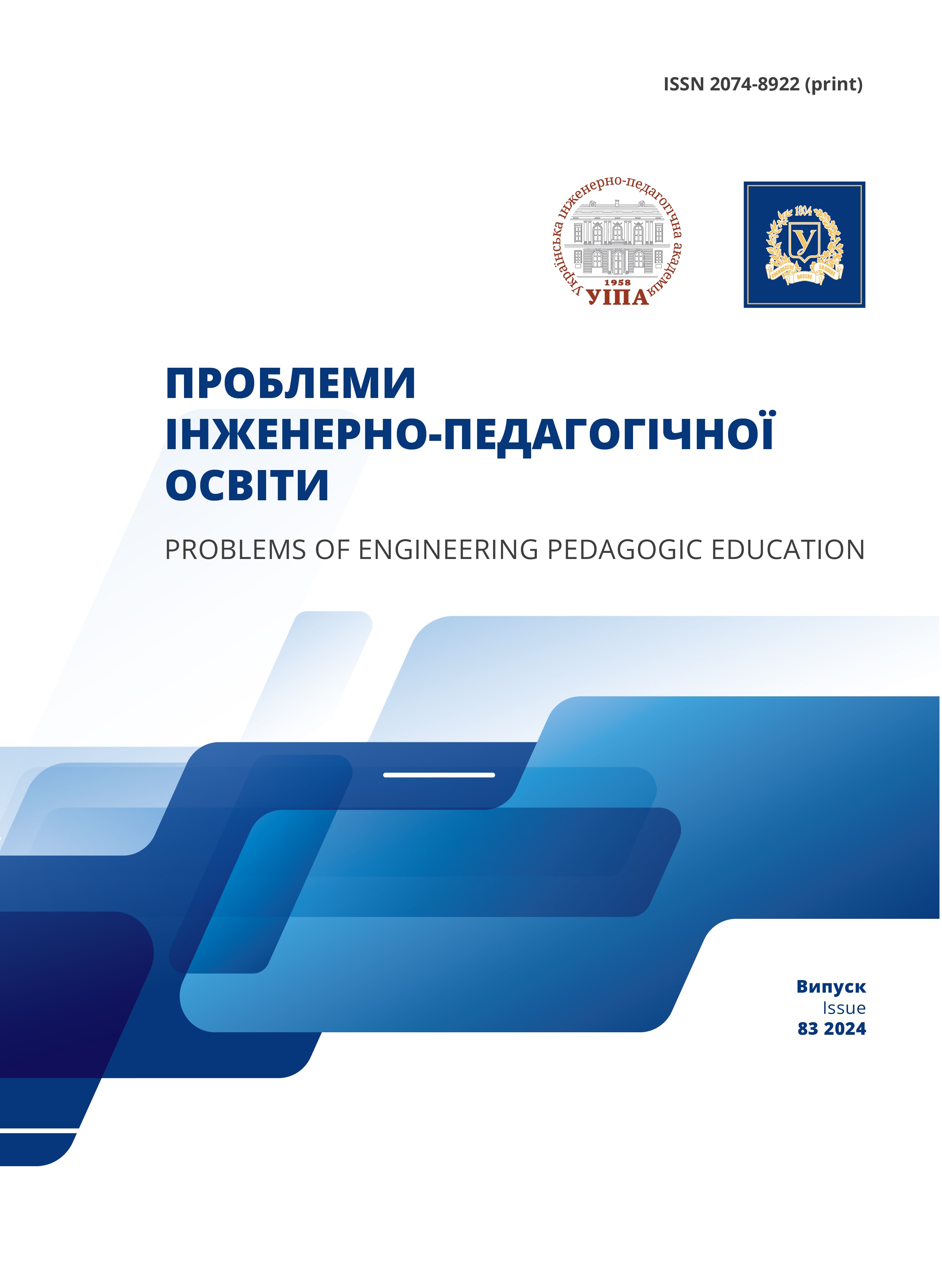ІНФОРМАЦІЙНО-ОСВІТНЄ СЕРЕДОВИЩЕ ЯК ПРОВІДНИЙ ЧИННИК ПРОФЕСІЙНОГО РОЗВИТКУ ПЕДАГОГІВ ПРОФЕСІЙНОГО НАВЧАННЯ
Анотація
DOI: https://doi.org/10.26565/2074-8922-2024-83-12
Мета. Мета статті полягає у виявленні провідних чинників професійного розвитку педагога професійного навчання в умовах інформаційно-освітнього середовища.
Методи. Задля досягнення мети використовувався комплекс загальнонаукових (аналіз, синтез, аналогія, порівняння, зіставлення, узагальнення, класифікація, систематизація), емпіричних (аналіз філософської, психолого-педагогічної, методичної літератури, нормативної документації) та універсальних (моделювання) методів.
Результати. Специфікою професійної діяльності в освітніх установах системи професійної освіти є: відсутність у педагогів спеціальної педагогічної освіти; приналежність освітньої установи до певної галузі народного господарства, для якої ведеться підготовка фахівців; включення в педагогічний колектив фахівців народного господарства непедагогічних галузей. Поняття «освітнє середовище» включає як різні суто інформаційні ресурси (інформаційно-технологічні, довідково-інформаційні, інформаційно-технічні, інформаційно-програмні, інформаційно-освітні й т.д.), так і сукупність соціально-комунікативних взаємозв’язків (мережеві спільноти, тематичні майданчики, сайти, майданчики блогерів і т.п.). Інформаційно-освітнє середовище створюване для професійного розвитку педагогів профнавчання, характеризується певними особливостями: насиченістю; відкритістю й доступністю; динамічністю; відсутністю географічних та політичних кордонів; активністю взаємодії; інтерактивністю; можливостями використання для самоосвіти, професійного розвитку елементів неформальної й інформальної освіти на основі застосування інтернет-ресурсів. Загальне бачення інформаційно-освітнього середовища закладу професійної освіти, котре було б ефективним чинником розвитку компетентності педагога професійного навчання, дозволило розробити відповідну модель.
Висновки. Сукупність конкретних чинників розвитку педагога професійного навчання містить: мотиваційний чинник, змістовний чинник, процесуально-технологічний чинник. Саме ці чинники здійснюють в умовах інформаційно-освітнього середовища професійної установи ефективний вплив на розвиток педагога професійного навчання. До перспектив подальшого дослідження можуть бути віднесені питання технічного й методичного забезпечення, а також виявлення та теоретичне обґрунтування організаційно-педагогічних умов упровадження моделі розвитку педагогів профнавчання в умовах інформаційно-освітнього середовища.
Як цитувати: Габрук О. О. Інформаційно-освітнє середовище як провідний чинник професійного розвитку педагогів професійного навчання. Проблеми інженерно-педагогічної освіти. 2024. Вип. 83. С.136-147. https://doi.org/10.26565/2074-8922-2024-83-12
Завантаження
Посилання
Vysotska, L. (2018). Іnformation and educational environment creation in vocational education and training institutions of service sphere. Scientific Herald of the Institute of Vocational Education of the National Academy of Education Sciences of Ukraine. Professional Pedagogics, 15, 116-123. https://doi.org/10.32835/2223-5752.2018.15.116-123 (in Ukrainian).
Kizim, S., Kutsak, L., Liulchak, S. (2017). Informational and educational environment as a means for modernization of the professional preparation of the future professionals. Physical and Mathematical Education, 4(14), 37-42.
URL: https://repository.sspu.edu.ua/handle/123456789/5968 (in Ukrainian).
Liakhotska, L. (2020). Distance learning and information and communication technologies in the system of open postdegree education: collection of training materials (working training programs, abstracts of occupations and special courses), DZVO «University of Management education», Kyiv. URL: https://lib.iitta.gov.ua/id/eprint/722171/1/%D0%A1%D1%82%D0%B0%D1%82%D1%82%D1%8F%201_%D0%9B%D1%8F%D1%85%D0%BE%D1%86%D1%8C%D0%BA%D0%B0.pdf (in Ukrainian).
Nikolaesku, I. (2017). Professional-pedagogical self-realization of the pedagogical education system manager by means of information and communication technologies: features of the formative stage of the study. Bulletin of the Cherkasy Bohdan Khmelnytsky National University. Series_«Pedagogical_Sciences», 17-18, 152-159. URL: https://ped-ejournal.cdu.edu.ua/article/view/2608/2754 (in Ukrainian).
Samko, A. (2021). Digital competence of pedagogical staff in the system of postgraduate pedagogical education. Educational Analytics of Ukraine: Higher education, 2(13), 33-43. DOI: 10.32987/2617-8532-2021-2-33-43. URL: https://science.iea.gov.ua/wp-content/uploads/2021/07/3_Samko_213_2021_33_43.pdf (in Ukrainian).
Familiarskaya, L. (2017). Information and communication mobility development of the teacher in the environment of postgraduate education, PhD thesis, Zhytomyr.
URL: http://eprints.zu.edu.ua/26076/ (in Ukrainian).
Tsymbal-Slatvinska, S. (2019). The concept of "information-educational environment" in terms of professional training of speech therapists. World Science, 3,(8(48), 9-16.
DOI: https://doi.org/10.31435/rsglobal_ws/31082019/6640 (in Ukrainian).
Yanovskiy, A. (2019). Information and educational environment in the conditions of distance learning. Humanities science current issues, 4(30), 310-315. DOI https://doi.org/10.24919/2308-4863.4/30.212627 (in Ukrainian).
Balyk, N., Shmyger, G., Vasylenko, Ya., Oleksiuk, V. (2020). Design of educational environment for teachers’ professional training. Ukrainian Journal of Educational Studies and Information Technology, 10(2), 12-25. URL: https://shibata.yubetsu.com/article/Xi28qkFL#Text (date of application 12/15/24). DOI: https://doi.org/10.32919/uesit.2022.02.02 (in Ukrainian).
Chernysh, V., Zadorina, O., Melnyk, K., Khromova, O., Danyliuk, M. Development of professional competence of present and future teachers under the conditions of transformational processes in education. Journal for Educators, Teachers and Trainers. 2020. Vol. 11. No.1. Pp. 56-67. DOI: 10.47750/jett.2020.11.01.006.
URL: https://jett.labosfor.com/index.php/jett/article/view/501/381 (in Ukrainian).
Gómez-Pablos, V. B., Matarranz, M., Casado-Arand, L.-A., Otto, F. Teachers’ digital competencies in higher education: a systematic literature review. International Journal of Educational Technology in Higher Education. 2022. Vol. 19. No. 1.
DOI: https://doi.org/10.1186/s41239-021-00312-8 .
Lytvyn, A., Lytvyn, V., Rudenko, L., Pelekh, Yu., Dіdenko, O., Muszkieta, R., Żukow, W. Informatization of technical vocational schools: Theoretical foundations and practical approaches. Education and Information Technologies. 2020. No. 25. Pp. 583–609.
DOI: https://doi.org/10.1007/s10639-019-09966-4 (in Ukrainian).
Mashrabjonovich, O. J. Formation of professional competence of the future teacher in the information and educational process. Central Asian Journal of Social Sciences and History. 2023. Vol. 4. No. 2. Pp. 107-111. DOI: https://doi.org/10.17605/OSF.IO/UST4P
Rakhimov, Z. Development of professional competence of educator. European Journal of Research and Reflection in Educational Sciences, Progressive Academic Publishing, UK. 2019. Vol. 7. No. 10. Pp. 99-106. URL: https://www.idpublications.org/wp-content/uploads/2019/08/Full-Paper-DEVELOPMENT-OF-PROFESSIONAL-COMPETENCE-OF-EDUCATOR.pdf
Schäfer, Pia, Link, Nico, Walker, Felix. 7 assessing professional knowledge of teachers at vocational schools–using the example of a professional development for automation and digitized production. Vocational Education and Training in the Age of Digitization: Challenges and Opportunities, Demand GmbH, Norderstedt, Germany. 2020. Pp. 131-154,

